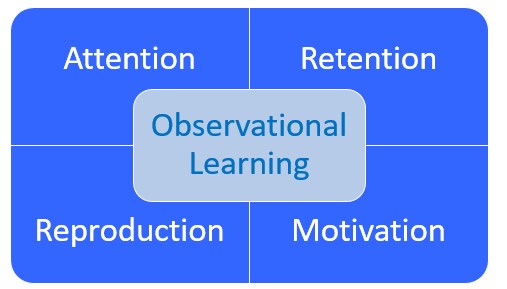
Observational Learning
Observational learning is the process of learning through observing the behaviors of others and imitating those behaviors.
Examples of observational learning include:
- A child learns how to tie their shoe by watching their older sibling.
- A child learns how to shoot a basketball by watching their favorite professional player.
- A person learns how to drive a car by watching their parent.
- A person learns how to ski by watching the instructor.
- A child learns how to fold laundry by watching their parent.
About Observational Learning
Observational learning is classified as a form of social learning. The Social Learning Theory was developed by Stanford psychology professor Albert Bandura. Bandura’s theory suggests that in addition to learning through conditioning, people also learn through interaction with other people by observing and imitating their actions.
Observational learning was first identified in Bandura’s famous experiment known as Bobo doll experiment. Bandura noticed that children often learn through imitating adults, therefore, he tested his theory. Through this experiment, Bandura found that children would hit the Bobo doll after viewing adults hitting the doll.
The Bobo Doll Experiments
During the 1960s, Bandura conducted a series of experiments on observational learning, collectively known as the Bobo doll experiments. Bandura tried to support his theory that all human behavior was learned through social imitation and copying, rather than inherited through genetic factors.
Bandura tried to prove that children would copy an adult role model’s behavior. He wanted to show by using aggressive and non-aggressive adult actors, that a child would tend to imitate and learn from the behavior of a trusted adult.
In these studies, children watched a film in which adults modeled either violent or passive behavior towards a toy called Bobo Doll. The Bobo doll was an inflatable toy about five feet tall, designed to spring back upright when knocked over. After viewing the film clip, children were allowed to play in a room with a Bobo doll just like the one they saw in the film.
The study showed that children were more likely to imitate the adult’s violent actions when the adult either received no consequences or when the adult was actually rewarded for their violent actions. Children who watched the film clips in which the adult was punished for their aggressive behavior were less likely to repeat the behaviors later on. Additionally, children who witnessed non-violent behavior behaved less aggressively toward the doll. Bandura concluded that children learn aggression, violence, and other social behaviors through observing the behaviors of others.
Four Conditions of Observational Learning
Bandura theorized that four conditions were necessary in any form of observing and modeling behavior:
- Attention
- Retention
- Reproduction
- Motivation
Attention – To learn anything through observation, the learner must first pay attention to the model. Without being attentive to the model, they will not be able to replicate the behavior.
Retention – Simply observing a behavior is not enough. The learner must also be able to retain the memory of what was done. This depends on the learner’s ability to code or structure the information in an easily remembered form and to mentally rehearse the model’s actions.
Reproduction – After observation, the learner must be capable of reproducing the actions of the model both physically and intellectually.
Motivation – The learner must have the desire to perform the action. Without motivation, the individual will not want to produce the learned behavior.

Conclusion
Observational learning is classified as a form of social learning. People learn through observing the behaviors of others and imitating those behaviors. This form of learning can be very influential, therefore, it is important to ensure the right kind of behaviors are observed.
Links


